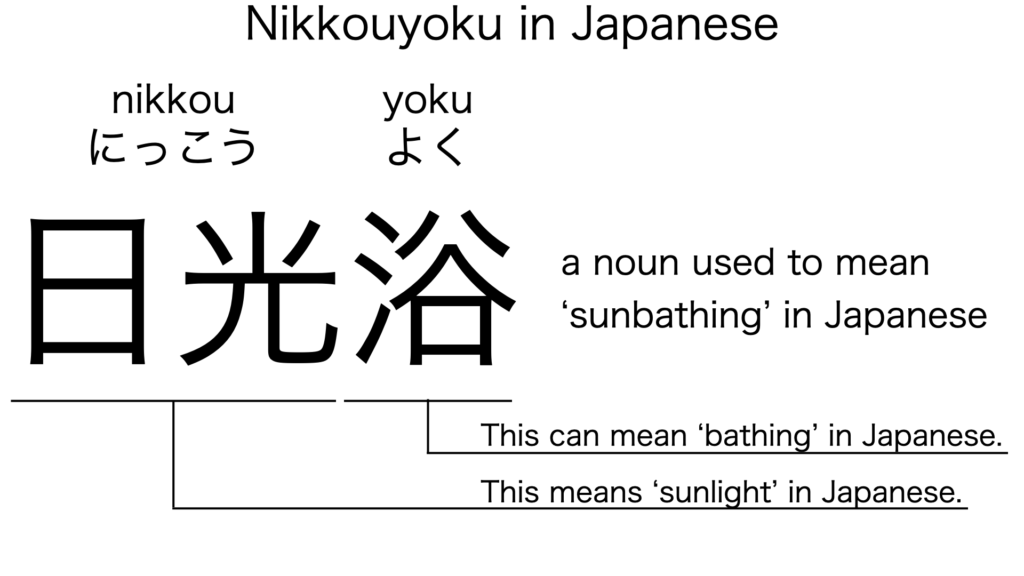What does “nikkouyoku” mean in Japanese?
Native speakers use nikkouyoku to mean ‘sunbathing’ in Japanese. Perhaps, some Japanese learners know this word as it is sometimes used in Japanese conversations. In this blog post, however, I’m explaining this word in detail based on its kanji expression. And also, I’m explaining how to use it through example sentences. My explanations would help Japanese learners understand nikkouyoku more clearly. Then, let’s get started!
Contents
Definition and meaning of “nikkouyoku”
Let me start with the definition and meaning of nikkouyoku.
- nikkouyoku – 日光浴 (にっこうよく) : a noun used to mean ‘sunbathing’ in Japanese.
The definition and meaning are simple and clear. To understand this noun more clearly, however, let me explain its kanji expression in detail.
Nikkouyoku in kanji
The kanji expression of nikkouyoku consists of the following two parts:
- nikkou – 日光 (にっこう) : a noun used to mean ‘sunlight’ in Japanese.
- yoku – 浴 (よく) : can be considered as the noun form of the verb, yokusuru, which means ‘to bathe’ in Japanese.
From these two parts, we can understand that nikkouyoku literally means ‘sunlight bathing’ in Japanese. This literal interpretation is very close to the actual meaning.

When we meet new kanji expressions, we should check their kanji characters in detail to understand their meanings clearly and deeply. In many cases, kanji characters tell us a lot about the meanings of the expressions they form. Actually, here, we could get the better understanding of nikkouyoku through the detailed kanji check above.
So far, I’ve explained the definition and meaning of nikkouyoku together with its kanji characters. Then, let me explain how to use it through the example sentences below.
How to say “sunbathing” in Japanese
watashi no neko wa nikkouyoku ga suki desu – 私の猫は日光浴が好きです (わたしのねこはにっこうよくがすきです)
My cat loves sunbathing.
Below are the new words used in the example sentence.
- watashi – 私 (わたし) : a pronoun used to mean ‘I’ in Japanese.
- no – の : a case particle used after a noun or pronoun to make its possessive case. In the example, this is used after watashi to make its possessive case, watashi no, which means ‘my’ in Japanese.
- neko – 猫 (ねこ) : a noun used to mean a ‘cat’ in Japanese. This can also work as plural. Learn more about Japanese plural.
- wa – は : a binding particle working as a case marker or topic marker. In the example, this works after watashi no neko to make the subject in the sentence.
- ga – が : a case particle used to make the subject word or the object word in a sentence. In the example, this is used after nikkouyoku to make the object in the sentence.
- suki – 好き (すき) : the stem part of the na-adjective, sukina, which means ‘favorite’ in Japanese. Native speakers, however, often use this as an individual word to mean ‘to like’ or ‘to love’ in Japanese. In the example, this is used to mean ‘to love’ in Japanese.
- desu – です : an auxiliary verb used after a noun or adjective to make it polite. Probably, this is well known as a part of the Japanese desu form. In the example, this is used after suki to make it sound polite.
This is a typical usage of nikkouyoku. In this example, it works together with the case particle, ga, to become the object in the sentence.
Another example of “nikkouyoku”
kanojo wa tokuni fuyu no nikkouyoku ga suki desu – 彼女は特に冬の日光浴が好きです (かのじょはとくにふゆのにっこうよくがすきです)
She loves sunbathing especially in winter.
Below are the new words used in the example sentence.
- kanojo – 彼女 (かのじょ) : a pronoun used to mean ‘she’ in Japanese.
- tokuni – 特に (とくに) : an adverb used to mean ‘especially’ in Japanese.
- fuyu – 冬 (ふゆ) : a noun used to mean ‘winter’ in Japanese.
- no – の : a case particle used to join two nouns. Normally, the first one can work as a modifier to describe the second. In the example, this is used to join fuyu and nikkouyoku. The formed phrase literally means ‘sunbathing in winter’ in Japanese. Word orders in Japanese and English are different, but the role of this case particle is similar to that of some English prepositions.
This is another example of nikkouyoku. In this example, it works together with fuyu and no to mean ‘sunbathing in winter’ in Japanese. When we want to mean ‘sunbathing’ in Japanese, anyway, this noun is always a very good option.
Summary
In this blog post, I’ve explained the definition and meaning of nikkouyoku in detail based on its kanji expression. And also, I’ve explained how to use it through the example sentences. Let me summarize them as follows.
- nikkouyoku – 日光浴 (にっこうよく) : a noun used to mean ‘sunbathing’ in Japanese. These three kanji characters literally mean ‘sunlight bathing’ in Japanese. This literal interpretation is very close to the actual meaning.
Hope my explanations are understandable and helpful for Japanese learners.
Leave a Reply